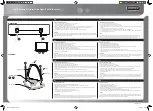
2
PRE-INSTALL ATION CONSIDERATIONS
Choosing a location:
(See Figure 1)
1) Anticipated Range:
Plan installation to stay within the
range of the antenna selected. Monitor's standard
antenna (small rubber duck style) can achieve dis-
tances of 5000 ft (1 mile) or greater in ideal conditions.
Longer transmission distances can be achieved with
higher performance antennas.
2) Idealizing Range:
The 900MHz frequency band is
capable of propagating around obstacles. However,
optimum performance is achieved when antennas are
positioned in the line of sight of each other. Whenever
possible, select antenna locations that are elevated
and where the signal can travel without being impeded
by large steel obstacles (such as the steel buildings).
An example of an ideal installation is as follows: One
Wireless
EZ
Communication Interface (radio/antenna)
is on an office roof wired to the control system (i.e.
Silo
Track
™ system or an
HMI
2
operator interface) and
the second
Wireless
EZ
Communication Interface
(radio/antenna) is on the top of the silo attached to a
safety railing wired to the sensors.
3) Cabling effects:
Due to the modest transmission power
of the radio, it is preferable to keep the antenna as close
to the
Wireless
EZ
Communication Interface (radio
module) as possible. Whenever possible mount the
antenna directly to the
Wireless
EZ
(radio module) in a
vertical orientation. In some challenging applications,
it maybe necessary to install a higher performance
antenna that requires co-axial cabling between the
radio and the antenna. The co-axial cable introduces
loss into the system thereby negating some benefit of
the better antenna. In these applications, keep the
coaxial cable as short as possible. Monitor's standard
length is three feet long (perhaps just long enough to
reach past/through a metal barrier). It is always
preferable to use the hardwired medium (RS-485) to
span the distance from the control system/sensors to
the
Wireless
EZ
Communication Interface (radio mod-
ule) than to use extended lengths of coaxial cable to
span the distance between the
Wireless
EZ
(radio
module) and the antenna.
Both the
Silo
Patrol
®
SMUse “smart” sensor (Refer to
Bulletin 344A) and the RS-485 equipped
Flexar
®
Guided
Wave Radar Sensor (Refer to Bulletin 354A) can be used
in conjunction with either the
Silo
Track
™ Inventory
Management PC-Based Software (Refer to Bulletin 344J)
or an
HMI
2
Operator Interface Control System (refer to
Bulletin 344B). Communication between the sensors and
the
Silo
Track
software or
HMI
2
is accomplished via a
2-wire RS-485 communication format. The
Wireless
EZ
Communication Interface can be used to replace the RS-
485 wiring between the sensors and the control system.
With reliable and affordable technology, the
Wireless
EZ
Communication Interface, in some cases, can be used to
lower the cost of installation and to overcome obstacles
that make hardwiring impractical or impossible.
Figure 1
RS-485
CABLE
RS-485
CABLE
Summary of Contents for WirelessEZ
Page 6: ...6 Figure 9...




























